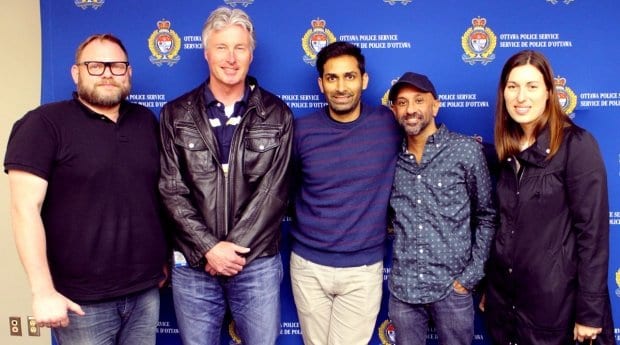The Ottawa Police Service GLBT liaison committee is considering striking up a subcommittee to gather expert advice.
Gary Leger, community co-chair, opened the May 25 meeting with a moment of silence in memory of T Eileen Murphy, a queer activist and longtime committee member who passed away earlier this month.
Heather Money and Preet Bhogal from the AIDS Committee of Ottawa (ACO) had a presentation called HIV 101. Jeremy Dias, director of the Canadian Centre for Gender and Sexual Diversity (CCGSD), also discussed HIV during his presentation.
When police put out press releases related to HIV criminalization cases, it’s important that HIV is put in the context of a health issue, Dias said. When people hear about HIV as an issue of crime and punishment, there’s a lost opportunity to refer people to support services, he said.
“We should maybe include information about testing,” Dias said. “We have amazing services, like every Thursday we have Gay Zone where people can get tested anonymously. We have Clarence Street [Sexual Health Centre] where people can get tested anonymously.”
Inspector John McGetrick, police co-chair, said personal health legislation prohibits police from naming a suspect’s infection or disease. That means police press releases couldn’t include referrals to counselling or HIV testing, but could only make a generic mention of Ottawa Public Health, he said.
Dias also suggested the liaison committee form a subcommittee of advisors who would be experts on various LGBT issues who and could be consulted before press releases were written.
In an interview with Daily Xtra, Leger said he agreed a subcommittee was a good idea, but added that he doesn’t think it’s needed specifically for press releases. Currently, when police need to write a media release that impacts the LGBT community, police reach out to the liaison committee, which in turn reaches out to community organizations, he said.
“I think the current model that’s in place works well,” Leger said. “Can it be improved on? I think so, they always can. It’s been in place for a few years. Some of the incidents that come out of press releases are few and far in between, but we want to make sure that we do the right thing.”
When Dias suggested police officers need more training on LGBT issues, Leger questioned how knowledgeable Dias could be about police training when he hadn’t attended the training.
“You were extended an invitation and your organization didn’t attend the most recent training,” Leger said. “It’s difficult to criticize training that hasn’t been either viewed or commented on when the training is looked at as a whole.”
Dias said that as a volunteer-based organization with many commitments, the CCGSD doesn’t have the staffing to attend everything, particularly when they’re running conferences outside of Ottawa. In an interview with Daily Xtra, Dias emphasized that he appreciated the liaison committee letting him present his suggestions and concerns, adding he’d find a way to make his organization more involved with the committee.
“We’re going to find someone to attend regularly,” Dias said. “We’re committed to coming to the table for now and finding out better ways to work together.”
Depending on what motion is brought forward at the next meeting, Leger said a subcommittee would work at arm’s length to gather feedback and expert advice from the community.
“What it does is you have the opportunity to have different people come in for specific key issues,” he said. “The subcommittee can very much rotate and gather the information as they need to.”


 Why you can trust Xtra
Why you can trust Xtra


